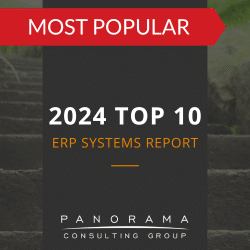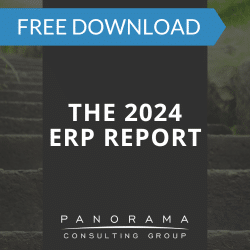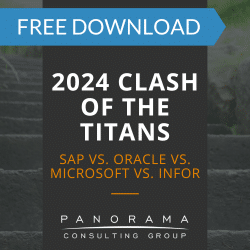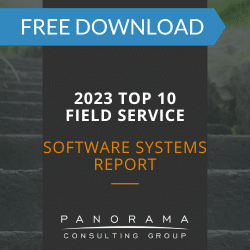While there are many different enterprise solutions on the market, enterprise resource planning (ERP) software and enterprise performance management (EPM) software are two solutions that many companies, across industries, consider for their business.
While these two systems might sound similar, they include their own unique features and functions. They also have a different focus and different benefits.
When it comes to the ERP vs. EPM comparison, the platform that’s best-suited for you depends on your organization’s needs. Today, we’re taking a closer look at what sets these systems apart.
What is ERP?
An ERP system automates and streamlines the back-office transactional processes that make up the bulk of your day-to-day business. For example, ERP systems include a general ledger that summarizes the details from core financial modules.
Authorized users can access ERP data to facilitate teamwork, gauge employee performance, and connect with customers. They can also gain full visibility into every facet of the company’s operations, tracking raw materials from procurement to delivery.
With this information, business leaders can make more informed decisions on how to use company resources.
The reason that many companies pursue ERP selection is because ERP software ultimately saves organizations time and money by automating processes that were once manual, tedious, and error-prone.
2024 Clash of the Titans
SAP, Oracle, Microsoft, and Infor each have a variety of systems that can support data-driven decision making. We surveyed customers of these four vendors to find out what their selection and implementation process was like.
What is EPM?
An EPM application often serves as an add-on to a comprehensive ERP platform. While ERP software optimizes operational data, EPM provides managerial insights into that data, which supports the following management processes:
- Planning
- Forecasting
- Modeling
- Advance analytics
- Data reporting
- Financial consolidation
It provides users with the tools they need to track, analyze, manage, and report on their business, with a broader perspective that goes beyond daily transactional activities.
Without an EPM component, it can be challenging to turn raw ERP insights into action. You might have the right forecasts and goals, but you need a way to recognize trends, predict outcomes, and monitor results.
While it’s critical to know how your business is performing, it’s also important to understand the implications that those metrics have on your business as a whole. With EPM, companies can use ERP data to make plans, drive strategies, and execute commands.
Typically, it’s the CFO or finance department that pushes for an EPM implementation, chiefly because this software can facilitate appropriate resource allocation.
Using EPM data, finance managers can perform the following tasks:
- Create initial targets
- Set initial budgets
- Create plans and forecasts
- Coordinate organizational planning
- Make decisions using financial and operational results
With EPM software, organizations can make decisions using “what-if” scenarios based on advanced EPM modeling and analytics.
However, without EPM, a finance department will often rely on their ERP to handle their day-to-day transactions, while handling managerial functions, like budgeting and reporting, on separate Excel spreadsheets.
While this approach might work for the short-term, most companies quickly outgrow such a time-consuming process.
Companies need an application that can automate and simplify data analysis, and EPM fits the bill. Not only can it integrate seamlessly with multiple ERP systems, but it’s also designed to work with human capital management (HCM) and customer relationship management (CRM) integrations.
ERP vs EPM: 3 Differences
If you’re considering an enterprise software implementation, you might wonder if you should pursue ERP, EPM, or both. Let’s look at a few of the main differences between these two types of platforms.
1. Areas of Focus
While ERP is primarily focused on transactional data, EPM focuses on managerial data.
EPM allows users to understand how their financial and operational performance is tied to their overall business performance and suggests changes they should make to optimize both. This is possible because EPM systems are designed to integrate with multiple other inputs, such as ERP software, to deliver advanced managerial insight.
2. Implementation Complexity
Depending on the features you need and your deployment model, an ERP implementation can take years to complete.
On the other hand, a standard, cloud-based EPM integration requires minimal IT support and usually only takes a few months. For this reason, many companies opt to install an EPM application before they pursue ERP.
However, it’s still common to implement ERP first, as the software often includes built-in EPM functionality that may be sufficient for the organization’s needs.
3. Scope of Reporting
An ERP solution can perform a certain amount of management reporting and consolidation. For instance, users can access data to create financial statements such as:
- Balance sheets
- Statements of cash flow
- Income statements
- Financial management reports (e.g. actual vs. budget variance)
While these functions overlap somewhat with EPM, the latter takes reporting much further. With EPM tools, finance leaders can set initial targets and coordinate financial planning across the organization.
They can also consolidate and report on financial results from multiple enterprise systems, as well as collect, compile, and manage budgets across the enterprise.
Which System is Right for Your Company?
As you weigh the pros and cons of ERP vs. EPM, you might be disappointed to find that there isn’t a one-size-fits-all answer. Instead, your specific business needs must guide your decision.
Many companies find that it’s beneficial to implement these platforms in tandem, as they complement each other. However, this isn’t the right choice for every organization.
Our ERP consulting team can help you assess your current technology and processes and determine the right IT strategy for your company. Contact us below to request a free consultation.














